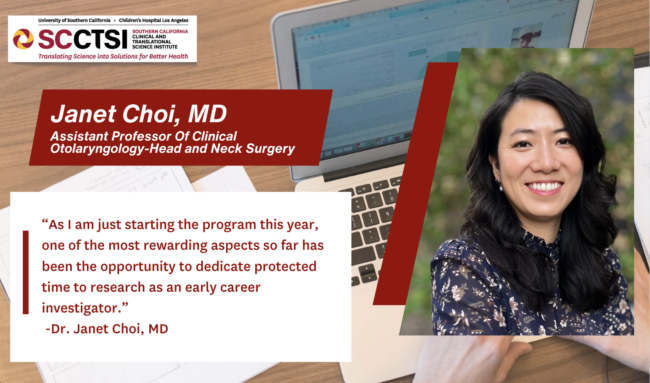Interview with Dr. Janet Choi, New KL2 Cohort 16 Awardee
We sat down with Dr. Janet Choi, a recipient of the SC CTSI Mentored Career Development in Clinical and Translational Science award, to hear about her experience as a KL2 scholar and how she has furthered her professional goals. We look forward to seeing all she will accomplish in the coming years.
Tell us a little bit about your experience so far in the KL2 program.
I am beginning my journey as a KL2 scholar this year as part of the new cohort. I am excited to join a vibrant community of clinician-scientists, mentors, and peers.
How did you first learn about the program?
I first became aware of the KL2 program during my residency training. The opportunity was further highlighted by my department chair and through conversations with colleagues who had previously participated as KL2 scholars. When I returned to USC as faculty after completing my fellowship, with a goal of pursuing a career as a clinician-scientist, the KL2 program stood out as an ideal opportunity to support and guide me on that path.
What initially got you interested in starting this program?
I became interested in pursuing a career as a clinician-scientist not only to provide the best possible care for my patients but also to contribute to generating high-quality evidence that can inform and improve clinical practice on a broader scale. The KL2 program offers a structured, supportive environment to help me achieve this goal, alongside mentors and peers who are equally committed to integrating clinical care and research.
Tell us about your own background as a researcher in your medical specialty.
Clinically, my focus is on ear-related disorders within the field of otolaryngology. My research specifically centers on understanding the role of hearing loss and its treatment in healthy aging. With a background in epidemiology and public health, I utilize epidemiologic data, clinical trials, and community-based initiatives to examine how interventions such as hearing aids and cochlear implants influence a range of health outcomes. A key focus of my work is improving access to hearing healthcare and promoting overall well-being among older adults.

What drove you to specialize in this?
I have personal experience with hearing loss, having lived with unilateral hearing loss since childhood and being a hearing aid user myself. This has given me unique insight into the challenges faced by individuals with hearing loss. I’ve also witnessed firsthand how hearing loss can impact my patients on many levels. What drives me is the current gap in access to hearing healthcare—largely influenced by the lack of high-quality evidence and health policy support in this area. This motivated me to focus my research on generating the evidence needed to inform clinical guidelines and influence healthcare policies.
What do you think that others can gain from this program?
The KL2 program offers a supportive community of clinician-scientists and multidisciplinary experts. Its structured framework provides not only essential mentorship but also critical training in research methods, grant writing, and career development—key resources that help scholars progress toward becoming independent investigators.
Have you run into any challenges or obstacles along the way?
One challenge I’ve encountered in defining research questions that are both clinically significant and feasible to address within available resources. Additionally, coming from a highly specialized clinical field, I initially found it challenging to communicate the broader significance of my research questions to interdisciplinary audiences. Through close mentorship and multiple iterations of feedback and revisions, I’ve been able to refine my focus. As I join the KL2 program, I am eager to continue building on these skills, further strengthen my research foundation, and learn how to effectively disseminate my findings to both the scientific community and the broader public.
What has been the most rewarding part of being a part of the KL2 program?
As I am just starting the program this year, one of the most rewarding aspects so far has been the opportunity to dedicate protected time to research as an early career investigator. The financial support from the KL2 program has allowed me to focus on developing and refining meaningful research questions that align with my long-term career goals.
What does the KL2 program mean to you and how has it furthered your career?
The process of applying for the KL2 program played a pivotal role in clarifying and strengthening my career trajectory as a clinician-scientist. It provided me with the structure and support to build a multidisciplinary research team, all of whom are deeply invested in my success. The constructive feedback I received during the application process helped sharpen my research design and outline clear next steps. I view the KL2 program as a critical stepping stone toward achieving my long-term goals in research and career development.
Who else has been an integral part of your success in this program?
The support from the KL2 program administrators, staff, my mentorship team, and my department has been invaluable throughout this process. Additionally, participating in the CTSI Biostatistics, Epidemiology, and Research Design (BERD) program prior to joining KL2 was instrumental in helping me define my research questions and methodological approach. Their guidance has been key in laying a strong foundation for my research career.



